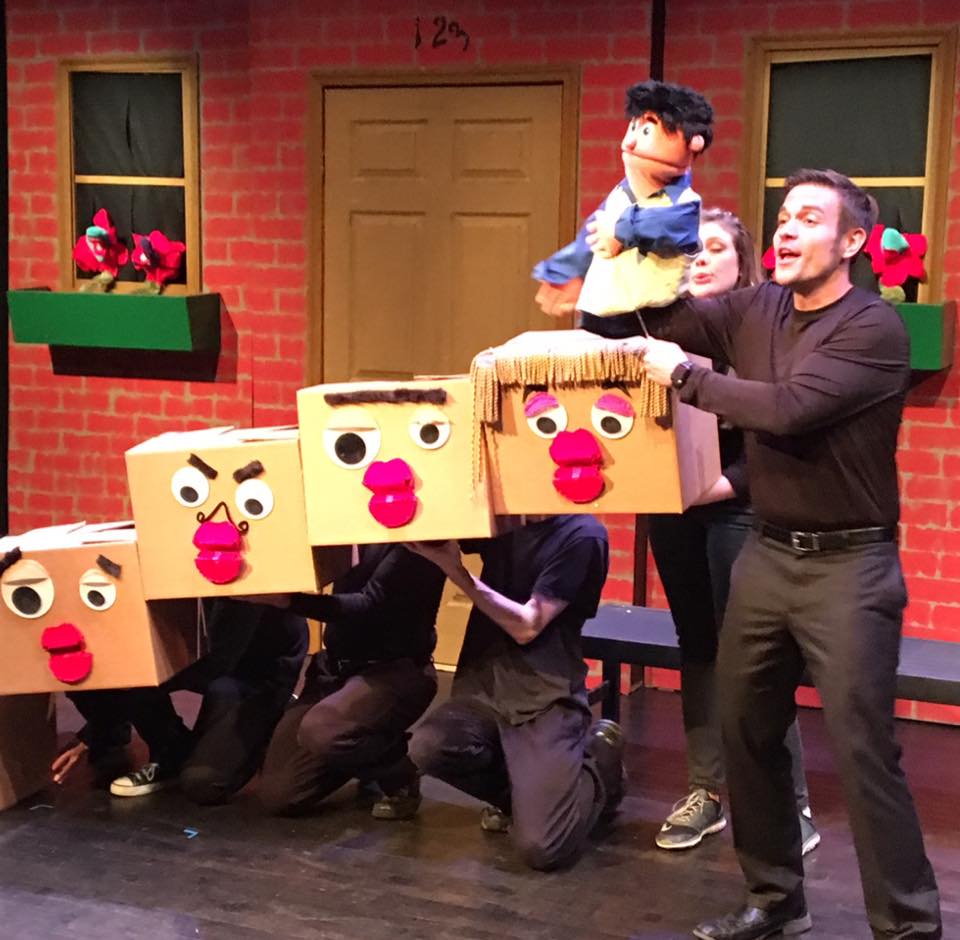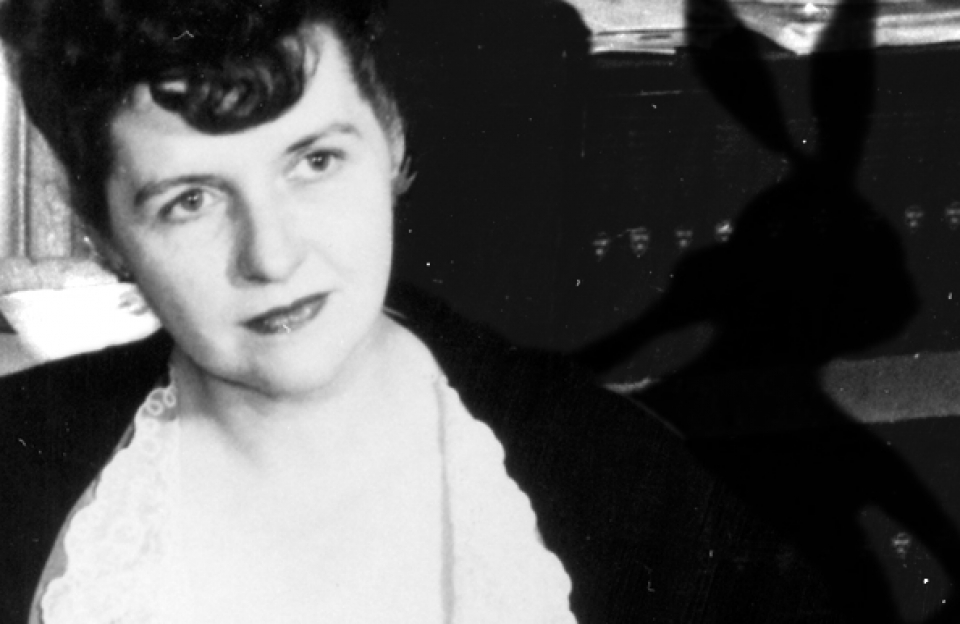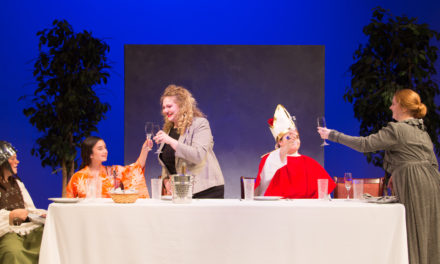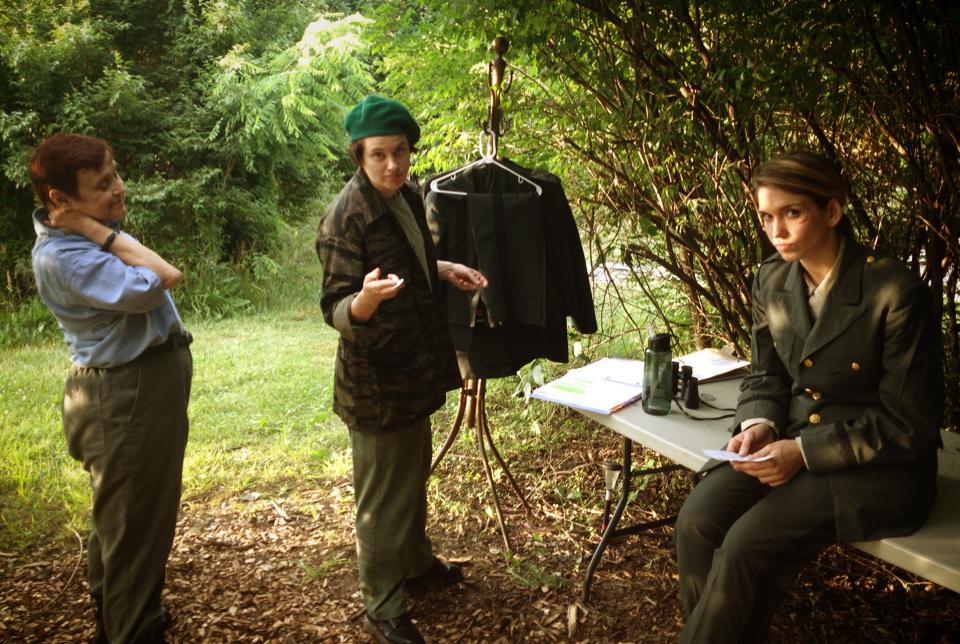Jason Bearden & Annie Bulliet in The Shape of Things. Photo: Bootstraps
The Shape of Things
By Neil LaBute
Directed by Bailey Storey
A review by Keith Waits
Entire contents are copyright © 2023 by Keith Waits. All rights reserved.
The word most often used to describe playwright and film director Neil LaBute is “misanthrope”. It may be a lazy description but LaBute certainly does have a harsh and cynical perspective on humanity, and he writes characters that engage in ethically dubious behavior yet suffer little to no consequences. In The Shape of Things, he depicts a degree of manipulation and cruelty that is shocking, but points to a mordant commentary on human relationships.
Adam (Jason Bearden) meets Evelyn (Annie Bulleit) in an art museum where he, working a part-time gig as a museum guard, interrupts her potentially vandalizing a classical statue because it had in recent years been updated with a fig leaf covering male genitalia. It should be noted that the decision to produce this play was made well before a certain kerfluffle over Michelangelo’s statue of David, even though the striking poster art by Hannah Brooks features that very David.
Evelyn is acerbic and challenging and almost immediately the laid-back Adam is drawn into an intense romantic relationship with her that results in eating better, exercise, and a general upgrade of Adam’s self-assurance. Yet, Adam’s old roommate Phillip (Austin Jones) and his girlfriend Jenny (Jordan Aiken) have friction with Evelyn almost immediately, and she affects no small influence on them as well.
Evelyn is a liberal, activist art student preparing her Master’s thesis exhibit, and she positions herself in contrast to the others as superior, and Annie Bulliet’s specialty as an actor is to effectively play distant, detached characters who are deicated either to their own self-delusion or an extremist cause. In the case of The Shape of Things, it is both.
LaBute isn’t indicting the contemporary world of art with his depiction of the arrogant, self-important Evelyn. That is too obvious and ham-fisted a statement to be the raison d’être for the play, but I think he is commenting on the inherently manipulative nature of human relationships in general and romantic relationships in particular. Once again, he is harsh in his point-of-view and unyielding in his conclusion, but it is all engrossing and provocaitive.
Bailey Storey’s direction is unorthodox and experimental, employing an unusual seating arrangement in which the small audience is positioned back-to-back in two rows that bisect the performance space. The actors play the scenes aternately from one side or the other, occasionally circling the audience while the scene was often simultaneously shown on four monitors using pre-recorded segments shot on location. It was curious to experience both a live and digital version of each scene, so that if a scene was staged behind you, the digital version easily became your focus, affording a comfortable but distant perspective.
In its execution, the distance was reinforced because the live action often finished ahead of the digital recording, so that the next scene onstage would wait for the video to finish, which upset the pace and flow of the live performance. The costumes mostly did not match as well, and I often preferred the physical nature of pre-recorded segments. That reaction felt odd, as if Story was inviting us too question and even abandon our connection to the live performance. If it is difficult to see the action, how easily will we settle for watching a screen, so pre-conditioned are we to do so in the digital age.
Even though they had to navigate this uneven dynamic, the four actors generally did good work, with Bulleit dominating with her sinister, foreboding Evelyn. Jason Bearden was an earnest and sympathetic Adam, and LaBute’s choice of names is further evidence of his misanthropy and perhaps misogyny. Austin Jones struggles a bit to keep Phillip from being a total jerk, leaning into the empty “bro-heim” aspect of the character. But maybe Phillip is just unredeemable. Jordan Aiken works hard to give Jenny greater dimension and succeeds enough to make you wonder if the writing demands such good work. The character is sometimes patronizing but always human, another person struggling to establish their own identity.
It’s worth being reminded that all four of these people are college students under the age of 25. So the range of naïveté, posturing, and manipulation is in people who believe they are fully mature but most certainly are not.
The mission of Bootstraps is to mentor and provide oportunities for the development of new directing talent, and Bailey Storey exploits that opportunity to take serious risks in his production. The use of prerecorded segments takes chances that partially pay off but aso hinder the production from having its full impact. Storey is intelligent in his choices and provides good opportunity to a cast trying to realize problematic characters. The final scenes suffer from being overly long and redundant in making their point but that point still resonates with observation and understanding. You may not entirely agree with The Shape of Things, but you will not easily forget what it says.
Featuring Jordan Aiken, Jason Bearden, Annie Bulliet, & Austin Jones
The Shape of Things
March 30, 31, April 1 & 2, 2023
Bootstraps
TheatreWorks of Southern Indiana/NAPAC
203 E Main St.
New Albany, IN 47150
Keith Waits is a native of Louisville who works at Louisville Visual Art during the days, including being the host of LVA’s Artebella On The Radio on WXOX 97.1 FM / ARTxFM.com, but spends most of his evenings indulging his taste for theatre, music and visual arts. His work has appeared in Pure Uncut Candy, TheatreLouisville, and Louisville Mojo. He is now Managing Editor for Arts-Louisville.com.





